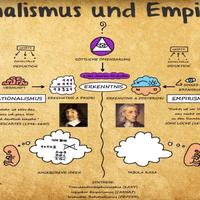Rationalismus und Empirismus
Rationalismus und Empirismus. Wie erlangt man Erkenntnis? Das ist eine der
wichtigsten Fragen der Erkenntnistheorie. Und die Antwort ist: Es kommt darauf an.
Man hat zum Beispiel erkannt, dass der Himmel blau ist und die sonne jeden
Tag im Osten aufgeht. Und woher weiß man das? Aus der Sinneserfahrung.
Man sieht mit den eigenen Augen, dass der Himmel blau ist und man erinnert sich
an viele Sonnenaufgänge im Osten.
Die Erkenntnis aber, dass 111 x 111 = 12321 ist,
stammt nicht aus der Sinneserfahrung, sondern aus der Vernunft.
Man kann diese Erkenntnis durch reines Denken im Kopf erlangen.
Liebe deinen Nächsten wie dich selbst. Dieser Satz stammt von Jesus.
Und woher hatte er diese Erkenntnis?
Aus der Sinneserfahrung? Aus der Vernunft?
Nein, durch Gott höchstpersönlich - angeblich.
In früheren Zeiten war göttliche Offenbarung noch als Quelle der Erkenntnis anerkannt.
Heute ist Gott
allerdings aus der Mode gekommen und göttliche Offenbarung wird gar nicht
mehr ernsthaft als Erkenntnisquelle in Betracht gezogen,
zumindest in der abendländischen Philosophie.
Wir zeichnen also ein mysteriöses Fragezeichen darüber und vergessen
diesen Teil erst mal.
Die Philosophie spaltet sich nun in zwei Lager: Auf der einen Seite steht der
Rationalismus, der die Vernunft als wichtigste oder sogar als einzige Quelle
der Erkenntnis betrachtet. Das andere Lager bildet der Empirismus, in dem
die Sinneserfahrung als die primäre oder sogar einzige Quelle der Erkenntnis gilt.
Der berühmteste Rationalist war René Descartes, ein französischer Philosoph des
fünfzehnten Jahrhunderts. Er sagte zum Beispiel: Wahr ist alles das,
was ich ganz klar und deutlich einsehe. Und damit meinte er
reine Vernunfterkenntnis. Die Antithese verkörperte der englische Philosoph John
Locke, der etwas später behauptete: Nichts ist im Verstand, was nicht vorher in den
Sinnen war. Damit bestritt er, dass reine Vernunfterkenntnis überhaupt möglich ist.
Rationalisten glauben an sogenannte angeborene Ideen, zum Beispiel die Idee
der eigenen Existenz, einfache mathematische und geometrische Grundsätze
und die Regeln des logischen Denkens. Natürlich denkt ein Baby noch nicht
wirklich über solche Ideen nach, aber sie sind schon von Geburt an im Menschen
angelegt und werden sich früher oder später entfalten so ähnlich wie das
Laufen oder das Nasepopeln. Durch logische Schlussfolgerungen kann sich die
Erkenntnis nun schrittweise erweitern, wie man am Beispiel der Mathematik sieht.
Für Empiristen dagegen ist der Mensch bei seiner Geburt ein völlig
unbeschriebenes Blatt, eine sogenannte tabula rasa. Sämtliche
Ideen entwickeln sich erst durch die Sinneserfahrung.
Dabei bilden sich zuerst einfache Ideen, wie die Ideen von Farben und Klängen.
Diese werden dann kombiniert zu komplexeren Ideen von Personen und Dingen
und Gesetzmäßigkeiten. Zu Gesetzmäßigkeiten gelangt man dabei durch das
Verfahren der Induktion.
Das heißt, man schließt aus der Beobachtung vieler Einzelfälle auf ein
allgemeines Gesetz. Die Sonne zum Beispiel ist gestern und vorgestern und die
Tage davor im Osten aufgegangen, also schließt man daraus, dass die Sonne
immer im Osten aufgeht. Bei rationalen Gesetzmäßigkeiten
verläuft die Erkenntnis anders, nämlich durch Deduktion.
Hier wird zuerst das allgemeine Gesetz durch die Vernunft erkannt und daraus ergeben sich
die Einzelfälle. Zuerst lernt man zum Beispiel die
Gesetzmäßigkeiten der Multiplikation, bevor man diese auf den Einzelfall 111 x 111
anwenden kann.
Rationalisten meinen, mit logischen Schlussfolgerungen und Deduktion an
sicheres und beweisbares Wissen zu gelangen.
Sie misstrauen aber der Induktion.
Denn auch wenn die Sonne tausend mal im Osten
aufgegangen ist, könnte sie morgen im Westen aufgehen.
Aber die Kritik am Empirismus ist noch viel grundlegender. Schon Platon hat
festgestellt, dass unsere Sinneswelt komplett illusionär sein könnte.
Wir könnten das ganze Leben träumen oder in einer Computersimulation leben.
Der Kritikpunkt der Empiristen am Rationalismus allerdings ist auch ein
grundlegender. Indem sie die Existenz angeborener Ideen bezweifeln, entziehen sie
auch der Vernunfterkenntnis den Boden. Sie meinen, dass auch die Vernunft durch
Erfahrung und Erziehung erlernt ist und kein universelles und sicheres
Erkenntniswerkzeug darstellt.
Wenn These und Antithese aufeinanderprallen, bemüht sich die
Philosophie glücklicherweise oft um eine Synthese in der die Gegensätze
aufgehoben werden. So hat Kant in seiner Transzendentalphilosophie
beide Erkenntniswege in ihrer jeweiligen Grenze anerkannt.
Die Erkenntnis aus der reinen Vernunft nannte er "Erkenntnis a priori",
das heißt Erkenntnis im voraus, weil diese Art der Erkenntnis vor aller
Sinneserfahrung möglich ist. Die empirische Erkenntnisse nannte er
"Erkenntnis a posteriori", das heißt Erkenntnis im nachhinein, weil diese art der Erkenntnis erst
nach der Sinneserfahrung möglich ist. Beide Erkenntniswege haben ihre Berechtigung,
allerdings bezieht sich laut Kant in beiden fällen die Erkenntnis nicht auf
die Welt an sich, sondern nur auf die Welt, wie sie uns aufgrund unserer
Wahrnehmungsorgane und Vernunftstruktur erscheint.
In der modernen Wissenschaftstheorie gibt es mit dem logischen Empirismus und dem kritischen
Rationalismus zwei weitere Syntheseversuche.
aber das ist eine andere Geschichte die
soll ein andermal erzählt werden.

